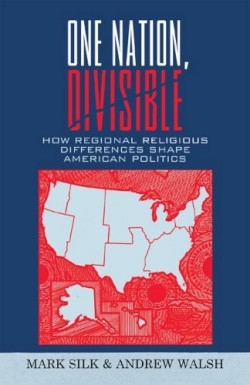One Nation, Divisible
How Regional Religious Differences Shape American Politics
Politicians would have a better understanding of why people vote the way they do if they grasped the impact of religious diversity in their communities, states, and the nation. Religion has frequently been the overlooked variable in determining how the nation’s regions differ politically and culturally.
In One Nation, Divisible: How Regional Religious Differences Shape American Politics, Mark Silk, professor of religion in public life at Trinity College and director of the Leonard E. Greenberg Center for the Study of Religion in Public Life, and Andrew Walsh, the center’s associate director, present a complex investigation into how religion has contributed to the nation’s culture on a region-by-region basis. The regions identified are: New England, Middle Atlantic, South, Midwest, Mountain West, Pacific, Pacific Northwest, and Southern Crossroads (Louisiana, Texas, Arkansas, Oklahoma, and Missouri).
The book is the final product of the “Religion By Region” project, an extensive study conducted by the Greenberg Center, and it includes a fascinating final chapter that revisits American history through the prism of regional religious affiliation. This scholarly work will appeal mostly to historians and political scientists, but it also will inform citizens and officials who want to gain insight into the often ignored role of religion in American society.
Reviewed by
Karl Helicher
Disclosure: This article is not an endorsement, but a review. The publisher of this book provided free copies of the book to have their book reviewed by a professional reviewer. No fee was paid by the publisher for this review. Foreword Reviews only recommends books that we love. Foreword Magazine, Inc. is disclosing this in accordance with the Federal Trade Commission’s 16 CFR, Part 255.

